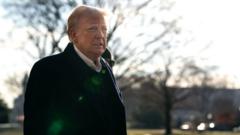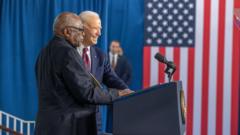In a controversial move, the Trump administration has dismissed a significant number of federal watchdogs, prompting reactions from both sides of the aisle and potential legal implications.
Trump's Dismissal of Federal Watchdogs Sparks Outcry

Trump's Dismissal of Federal Watchdogs Sparks Outcry
Late-night firings raise alarms over government accountability amid legal concerns.
In a striking turn of events late Friday evening, the Trump administration initiated the termination of at least a dozen federal inspectors general, a decision that has raised serious questions about legality and accountability. Senate Minority Leader Chuck Schumer characterized the firings as a "chilling purge" during his remarks on the Senate floor Saturday. He argued that this act reflects Trump's aversion to accountability and transparency.
As reported by CBS News, affected watchdogs received abrupt termination notifications via email from the director of presidential personnel, stating that their roles were being eliminated "due to changing priorities," effective immediately. The dismissed inspectors include key positions such as the inspector general for the Department of Health and Human Services and the Small Business Administration. Reports indicate that additional inspectors general from multiple departments—including agriculture, defense, and veterans affairs—were also part of those considered for dismissal.
These independent watchdogs were established following the Watergate scandal to combat corruption, fostering a layer of oversight separate from agency heads. Although appointed by the president, the expectation is that they will function nonpartisanly to protect the integrity of federal operations.
The firings might violate a federal law mandating that the administration provide 30 days' notice and specific justification before terminating a federal inspector general. Hannibal Ware, who led the inspectors general council, formally suggested to the White House that the dismissals lacked legal legitimacy and advised reconsideration.
Democrats quickly condemned the actions, with Schumer labeling them as a prime example of a "lawless approach" by Trump. Virginia's Gerry Connolly referred to the firings as a "Friday night coup" aimed at undermining accountability. Interestingly, some Republican officials, such as Senators Chuck Grassley and Susan Collins, have also expressed concern. Collins questioned the rationale behind dismissing individuals tasked with identifying waste and fraud in government, echoing the growing unease about the implications of these firings.
As the fallout from this unprecedented move continues to unfold, the administration remains silent on the specifics of the firings, leaving many to speculate what repercussions lie ahead for both Trump and his now-vacated watchdog positions.



















